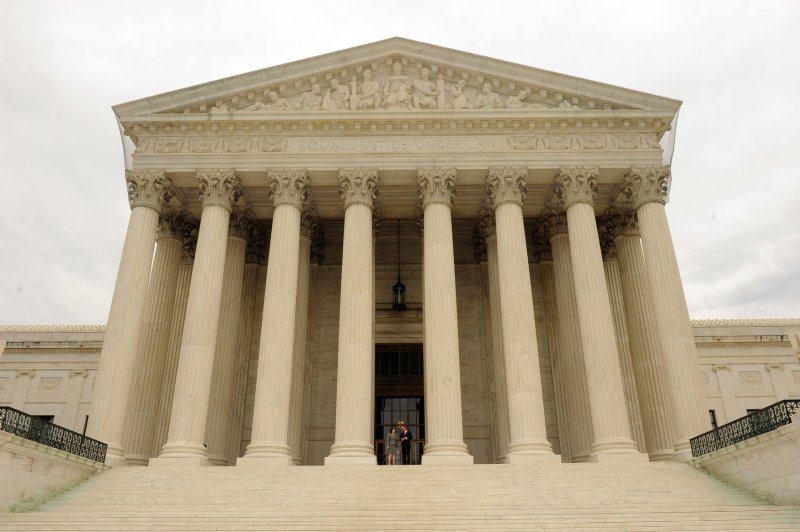United States Supreme Court. (File/UPI/Roger L. Wollenberg) |
License Photo
The Supreme Court on Thursday asked a state court to clarify questions about an Oklahoma abortion law that bans off-label use of certain abortion-inducing drugs, including RU-486.
Oklahoma's expanded law aims to cover the "off-label use of drugs known to have abortion-inducing properties."
The law, passed in 2011, required doctors to follow strict U.S. Food and Drug Administration guidelines and prohibited off-label uses of certain abortion-inducing drugs, including changing a recommended dosage or prescribing it for different symptoms. The law also required doctors to examine women before prescribing the drugs, document medical conditions and schedule follow-up appointments.
Mifepristone, marketed under the trade names Korlym and Mifeprex, is better known as the abortion pill RU-486. The FDA has approved RU-486 for medical termination of intrauterine pregnancies of up to 49 days gestation, and for use in combination with gemeprost for termination of pregnancies between 13 and 24 weeks gestation.
Under the FDA-approved regimen, a 600 mg dose is administered by a clinician following a counseling session. Two days later, a clinician administers 400 micrograms of another medicine, misoprostol, to induce contractions.
Challengers, led by the Center for Reproductive Rights, argued the restrictions are "severe," "contrary to all available medical evidence," "burdensome" and arbitrary.
The requirement of in-person clinical administration of both doses, as well as followup appointments, constitute an undue burden according to the challenge.
SCOTUS justices noted that the law's challengers had argued that H.B. 1970 "coerce[s] some women to have unwanted and unnecessary surgery."
This argument "simply ignores the fact that the decision to undergo an abortion remains with the pregnant woman herself," the justices concluded in a footnote. "H.B. 1970 does not 'coerce' any woman into having an abortion -- medical or surgical -- it merely regulates the circumstances under which a medical abortion may be performed."
The Supreme Court sent the case back to the state for clarification. The justices want to know if the Oklahoma law “prohibits the use of misoprostol to induce abortions, including the use of misoprostol in conjunction with mifepristone according to a protocol approved by the Food and Drug Administration.” The high court also wants to know if the law stops “the use of methotrexate to treat ectopic pregnancies,” which is when an embryo implants somewhere outside of the uterus.
Further proceedings in this case "pending receipt of a response from the Supreme Court of Oklahoma."















